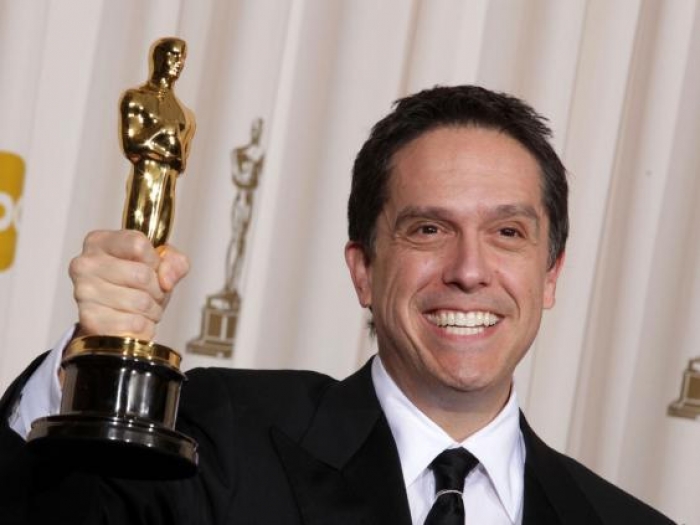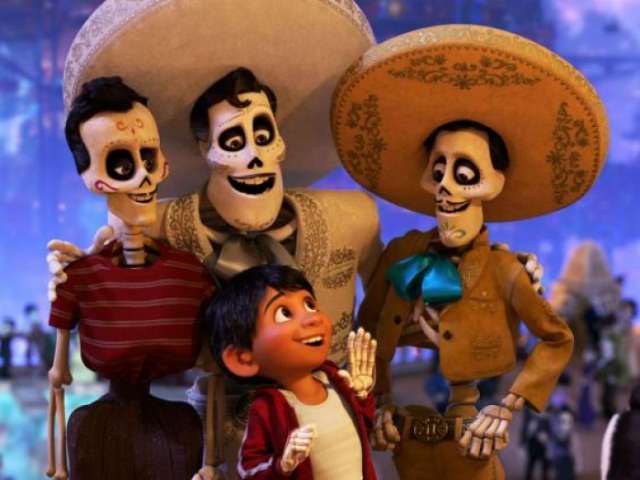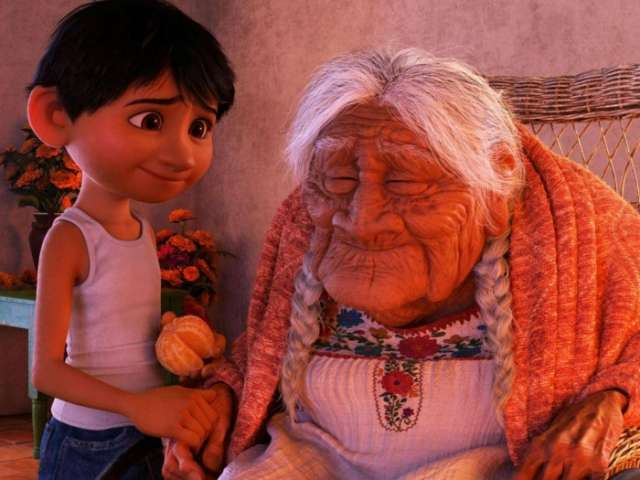Next up is Coco, a beautifully imagined depiction of Mexican holiday Día de Muertos (English translation: Day of the Dead) following 12-year-old boy Miguel who meets generations-worth of his relatives after being transported to the afterlife, a journey which unlocks enlightening secrets to his family history.
Coco stands tall as one of Pixar's greatest achievements to date while sitting comfortably alongside both Toy Story 3 and the first 10 minutes of Up in the high-emotion echelons bolstered by the profound notion at its heart: "the final death" - dying in the afterlife once forgotten by those you left behind. Unkrich reveals that Coco - six years in the making - began life as something rather different before he honed in on this philosophy, something you'd expect from a David Lynch nightmare as opposed to a glorious Pixar tale.

Lee Unkrich won an Oscar for 'Toy Story 3' in 2011 (Rex)
“Early in our research we learned about the notion of the final death - this idea that you die but then you can die again when there is nobody left who remembers you," he says.
"At the time, we thought it was a poignant idea and it was something we wanted in the movie but after some time we came to the realisation that no, that’s the idea of the movie which needed to permeate everything in the film.”
Coco's prevailing themes pitch it as the rarest of family films: a tactful guidebook on dealing with impending death, best encapsulated by its theme track, "Remember Me." Written by husband-and-wife duo Robert Lopez and Kristen Anderson-Lopez - whose credits include comedy musicals Avenue Q, The Book of Mormon and Disney smash Frozen - the end product simply wouldn't pack such heft without it.
"Many things changed over time," Unkrich levels, "but that stayed fixed."
Another vital factor in the film's success is Coco herself, the titular elderly grandmother to Miguel who spends the entirety of the film sat immobile in her chair as her family goes about their days around her. At once the silent heart of this story, not to mention the source of her grandson's motivation, the animators were tasked with breathing life into a character in the final stages of her own.

Pixar's latest 'Coco' depicts Mexican holiday, Day of the Dead (Walt Disney Studios Motion pictures)
"I wanted her to be believably really really old," Unkrich states. "[Co-director] Matt Aldrich, our first screenwriter, described Grandma Coco in the script as a living raisin. I always loved that. I wanted her face to be a roadmap of her long life but at the same time, I also wanted it to feel like she had almost reverted into being a child again which is why we gave her braids."
Some may unfairly question the film's suitability to children with cinemagoers essentially unsuspecting puppets at Pixar's emotional mercy. This argument isn't lost on Unkrich who came to a realisation following his Toy Story 3 experience.
“The whole notion of kids watching the film vs adults is interesting. Some folks told me Toy Story 3 was too intense on kids but I think what was really happening is that their kids were feeling strong emotions and parents naturally want to protect their kids from having those feelings. But the reality is: kids don’t have a sense of their own mortality - or most kids don’t - so they would watch that scene at the end of Toy Story 3 through very different eyes than their parents were."
He pauses, before admitting: "Although I've heard a lot of surprising stories of kids crying in Coco. At the end of the day, we don’t make movies for kids, we make them for everybody - for adults and ourselves. We just make sure they’re appropriate for kids."
The aforementioned Toy Story 3 sums this point up nicely, a sequel parading as a children's film that's in actuality a 15-year payoff aimed at university student twentysomethings who were children at the time of number one's release in 1995. Unkrich was reminded of the memorably heart-wrenching final scene when writing Coco's emotional climax.
"The first time I put music up against the end of Toy Story 3 - when Andy is giving his toys to Bonnie - it brought tears to my eyes. [The same thing happened when] I put together the scene at the end of Coco in storyboard form [no spoilers here; just bring tissues] - it definitely felt emotional to me even though we weren't using our real actors yet.
"I have to hold on to that because it’s then going to be years before we actually animated the scene, so I have to remember how it was emotionally affecting and not fall into the trap of wanting to change it."
Unkrich is hopeful that Coco will be similarly viewed through different lenses with every passing year, much like one of the director's personal favourite films.
“I really love the Ron Howard film Parenthood. I first saw it when I was in college and related to certain characters in a certain way. But as I've grown and had kids of my own, my wife and I keep coming back to it and every time that we watch it, it’s a completely different movie. We're progressively aligned with older characters - it keeps giving. I hope Coco can be that kind of movie.
How about Unkrich himself? For someone who has drawn countless tears from people around the world, he's far from made of stone.
"There are actually very few movies that made me cry but there have been a few that reduced me to a puddle. One of them was Terence Malick's film The Tree of Life. I found it - for whatever reason - very very affecting. Also, the movie about the tsunami, The Impossible wrecked me - having a family myself and wondering what you would do in a situation like that. And there was a movie not long ago called Short Term 12 which affected me because of some personal reasons. Those are three I can think of that made the waterworks really come out.
Which Pixar film would he rate as the saddest?
"I remember when we were working on The Good Dinosaur, there’s a whole beautiful scene towards the end of the film where Spot is having to say goodbye to Arlo before heading off with this new family and I just really love that scene. I love the time that they took to slowly let it play out and let the emotion build. I'd probably say that for Pixar."
The original article was published in the Independent.
More about: #Pixar
















































